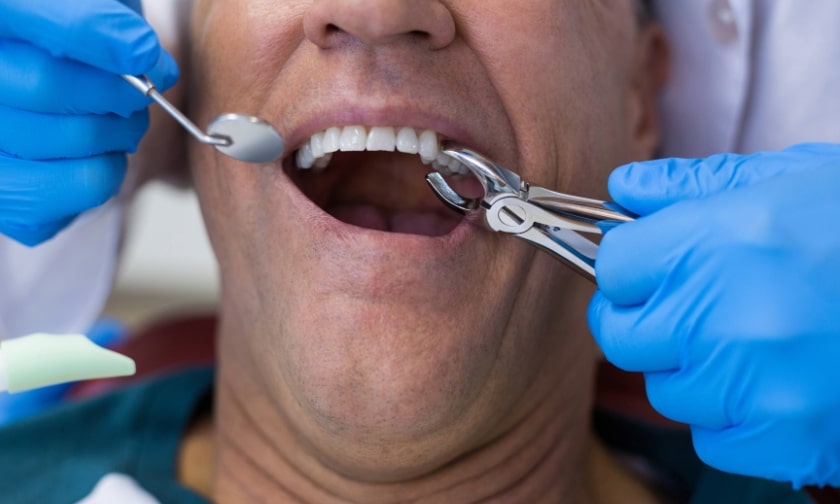5813 Centre Ave, Pittsburgh, PA 15206

When it comes to dental care, one common procedure many people face is wisdom tooth extraction. While it’s a routine dental surgery for many, it can feel like a big decision when the time comes.
Wisdom teeth—also known as third molars—are the last set of teeth at the back of your mouth, and they often emerge during the late teen or early adult years. For some, these teeth cause no issues, but for others, they can lead to complications that require removal.
In this blog, we’ll explore the benefits and risks of wisdom tooth extraction, and why it might be the right choice for your oral health.
Why Consider Wisdom Tooth Extraction?
In many cases, wisdom teeth do not cause any problems. However, for some people, wisdom teeth may cause discomfort or health issues. Here are a few common reasons why wisdom tooth extraction is necessary:
- Impaction: Wisdom teeth can sometimes grow in at an angle, leading to impaction. This means the tooth is trapped beneath the gum or only partially erupts. This can cause pain, swelling, and even infection.
- Crowding: If there isn’t enough space in your mouth, wisdom teeth can push against neighboring teeth, leading to crowding and misalignment of your other teeth.
- Infection or Gum Disease: Partially erupted wisdom teeth are difficult to clean properly, which can lead to bacterial buildup, infection, or gum disease.
- Cysts or Tumors: In rare cases, a cyst or tumor can form around an impacted wisdom tooth, potentially damaging the jawbone and nerves.
Benefits of Wisdom Tooth Extraction
1. Prevents Future Complications
Removing wisdom teeth before they cause serious issues can prevent pain, infection, and damage to surrounding teeth. Early extraction can reduce the risk of more complicated surgery down the road.
2. Reduces the Risk of Crowding
When wisdom teeth push against other teeth, they can cause misalignment or crowding. Extracting the wisdom teeth can help maintain the alignment of your smile and reduce the need for braces or other orthodontic treatments.
3. Avoids Gum Disease and Cavities
Because wisdom teeth are located at the back of your mouth, they’re harder to clean. This makes them more susceptible to cavities, gum disease, and infection. Removing these teeth reduces your risk of developing these conditions.
4. Preserves Your Oral Health
By removing wisdom teeth, you can avoid possible complications like cysts or damage to your jaw. Wisdom tooth extraction in Pittsburgh may also help preserve your long-term oral health, ensuring your remaining teeth stay healthy for years to come.
The Risks of Wisdom Tooth Extraction
While the benefits of wisdom tooth extraction are clear, it’s important to be aware of the risks involved in the procedure.
1. Swelling and Bruising
As with any surgery, there may be some swelling and bruising after the extraction. This is a normal part of the healing process, and a dentist will provide instructions on how to minimize these effects.
2. Infection
Though rare, there’s a small risk of infection after the extraction. Following a dentist’s aftercare instructions, such as keeping the extraction site clean, can reduce the risk of infection.
3. Nerve Damage
In very rare cases, the extraction process can lead to nerve damage, which may result in temporary numbness or tingling in the lips, tongue, or chin. This is more common if the wisdom teeth are located near nerves, but it usually resolves with time.
4. Dry Socket
Dry socket occurs when the blood clot that forms in the extraction site is dislodged, leaving the bone exposed. This condition is painful and can delay the healing process. It can be avoided by following aftercare instructions carefully.
According to the American Association of Oral and Maxillofacial Surgeons, 90% of people will need to have their wisdom teeth removed at some point. This statistic highlights just how common wisdom tooth extraction is as a preventative measure for better oral health.
What To Expect During and After The Procedure?
Before the Procedure: Wisdom tooth extraction is typically performed under local anesthesia, which numbs the area around the teeth. For patients who feel anxious, sedation options like nitrous oxide (laughing gas) or oral sedatives may be offered.
After the Procedure: You may experience some swelling, bruising, and mild pain for a few days following the surgery. Most of these symptoms can be managed with over-the-counter pain relievers and ice packs. You should also follow the dentist’s aftercare instructions to avoid complications and promote healing.
Wisdom tooth extraction is a common and necessary procedure that can prevent future dental problems such as impaction, crowding, and infection. While there are some risks associated with the surgery, the benefits far outweigh them, especially if the teeth are causing discomfort or other health issues. By removing your wisdom teeth early, you can preserve your oral health and avoid more complicated procedures in the future.
If you’re experiencing pain or discomfort from your wisdom teeth, it’s important to consult with our dentist to determine whether extraction is the right choice for you. They will be able to provide you with the best recommendations to ensure your smile stays healthy and bright.

